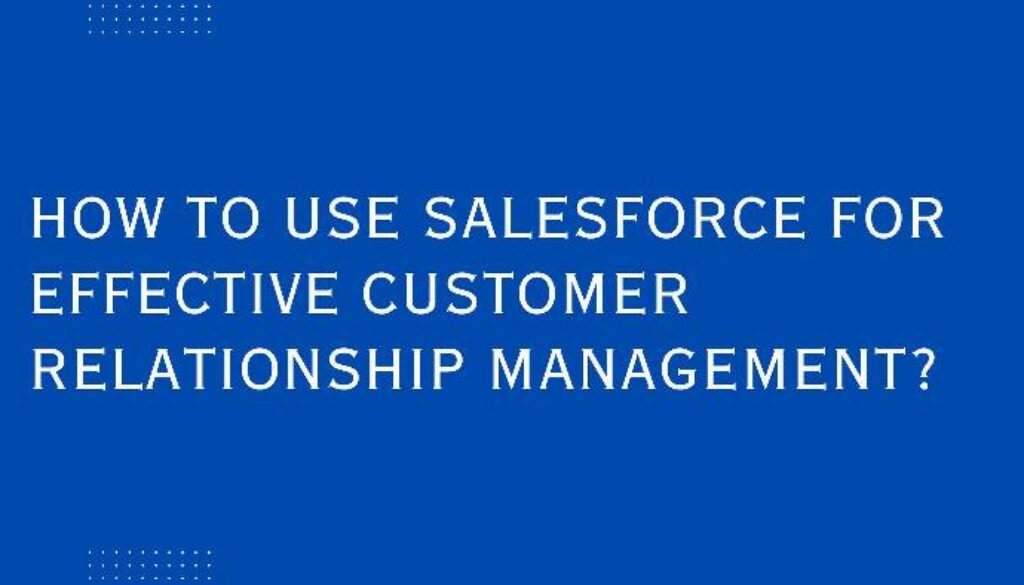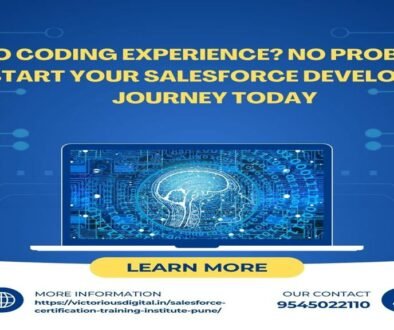How to Use Salesforce for Effective Customer Relationship Management?
Customer Relationship Management (CRM) plays a crucial role in the success of any business. Salesforce, a leading CRM platform, provides organizations with a powerful toolset to manage customer interactions and improve overall customer satisfaction. In this article, we will explore how to effectively use Salesforce for CRM, from setting up the system to utilizing its features for enhanced customer engagement and streamlined processes.
Setting up Salesforce
Before diving into the vast array of features offered by Salesforce, it’s important to set up the platform to align with your business goals and requirements. Begin by defining your CRM objectives and understanding the specific needs of your organization. Next, customize Salesforce to reflect your sales processes, data fields, and workflows.
Create and manage user profiles and permissions to ensure data security and access controls. Import existing customer data into Salesforce, making sure it is clean and accurate. Salesforce provides tools to deduplicate and validate data, ensuring the integrity of your CRM system.
Managing Customer Data
Salesforce offers robust capabilities for managing customer data, allowing businesses to gain valuable insights and improve customer interactions. Start by creating comprehensive customer profiles, including contact information, purchase history, and communication preferences. Use custom fields and objects to capture additional relevant information specific to your business.
Leverage Salesforce’s data management features, such as data import wizards and data loader tools, to maintain accurate and up-to-date customer records. Regularly clean and update your data to eliminate duplicates and inaccuracies.
Implement data segmentation to categorize customers based on demographics, purchase behavior, or any other relevant criteria. This segmentation enables targeted marketing campaigns and personalized communication, leading to better customer engagement and conversion rates.
Streamlining Sales Processes
Salesforce offers a wide range of features to streamline sales processes and improve efficiency. Start by creating a standardized sales pipeline that reflects your unique sales stages. Customize opportunity stages and configure sales processes to match your organization’s workflow.
Utilize Salesforce’s automation tools, such as workflow rules, approval processes, and email templates, to automate repetitive tasks and streamline sales operations. Set up reminders and alerts to ensure timely follow-ups and prevent potential leads from falling through the cracks.
Implement lead scoring to prioritize and qualify leads based on predefined criteria. By identifying high-quality leads, your sales team can focus their efforts on prospects with the highest potential for conversion.
Integrate Salesforce with other tools and systems used in your organization, such as email marketing platforms or customer support systems, to facilitate seamless data exchange and collaboration across departments.
Enhancing Customer Engagement
Salesforce offers various features to enhance customer engagement and provide personalized experiences. Leverage Salesforce’s email marketing capabilities to create targeted email campaigns and track customer responses. Utilize the power of marketing automation to deliver the right message at the right time based on customer behavior and preferences.
Implement customer service and support functionalities, such as case management and knowledge bases, to provide timely and efficient support to your customers. Use Salesforce’s service cloud to track customer issues, manage customer interactions, and measure customer satisfaction.
Take advantage of Salesforce’s social media integration to monitor and engage with customers on platforms like Facebook and Twitter. This allows you to respond to customer inquiries and feedback promptly, fostering a positive brand image and building stronger relationships.
Analysing Performance and Metrics
Salesforce provides a wealth of reporting and analytics
tools to measure and analyse your CRM performance. Utilize Salesforce’s reporting capabilities to generate insightful dashboards and reports that provide visibility into sales activities, customer interactions, and overall business performance.
Monitor key performance indicators (KPIs) such as sales revenue, lead conversion rates, and customer satisfaction scores. Identify trends, patterns, and areas for improvement by analysing data from various angles.
Utilize Salesforce’s forecasting features to predict future sales and revenue based on historical data and sales pipeline. This helps in making informed business decisions and setting realistic targets.
Leverage artificial intelligence-powered features like Einstein Analytics to gain deeper insights and uncover hidden opportunities within your CRM data. Identify upsell and cross-sell opportunities, predict customer churn, and optimize sales strategies based on AI-driven recommendations.
Regularly review and analyse your CRM data to identify areas for improvement in your sales processes, customer engagement strategies, and overall business performance. Use this information to refine your CRM strategies and drive continuous growth.
Training and Support
To maximize the benefits of Salesforce for effective CRM, it is crucial to provide proper training and support to your team. Salesforce offers comprehensive training resources, including online tutorials, documentation, and certifications, to help users understand the platform’s functionalities and best practices.
Organize training sessions or workshops to educate your team on how to effectively utilize Salesforce for CRM. Cover topics such as data entry, lead management, opportunity tracking, and reporting.
Encourage your team to actively explore Salesforce’s Trailhead platform, which offers interactive learning modules and hands-on exercises to deepen their understanding of the platform.
In addition to training, ensure ongoing support for your team by designating Salesforce administrators or superusers within your organization. These individuals can troubleshoot issues, provide guidance, and address any questions or concerns that may arise.
Regularly communicate updates and new features to your team to keep them informed and encourage continuous learning and exploration of Salesforce’s capabilities.
Continuous Improvement and Adaptation
The CRM landscape is constantly evolving, and it is essential to adapt and continuously improve your Salesforce implementation to stay ahead. Regularly review and assess your CRM strategies, processes, and performance metrics to identify areas for enhancement.
Engage with your team and gather feedback on their experience using Salesforce. Encourage them to share ideas and suggestions for improvement. This collaborative approach ensures that Salesforce is tailored to the specific needs of your organization.
Stay updated with new Salesforce releases, updates, and features. Take advantage of these enhancements to optimize your CRM processes and enhance customer engagement.
Participate in Salesforce user communities, forums, and events to connect with other users and learn from their experiences. These communities provide valuable insights
Conclusion
Salesforce is a powerful CRM platform that can revolutionize the way you manage customer relationships. By effectively utilizing Salesforce’s features, organizations can streamline sales processes, enhance customer engagement, and make data-driven decisions to achieve their CRM objectives. From setting up the system to analysing performance metrics, Salesforce offers a comprehensive toolkit for successful customer relationship management. By harnessing the full potential of Salesforce, businesses can build strong and long-lasting relationships with their customers, resulting in increased customer satisfaction, loyalty, and ultimately, business growth.
If you are interested in joining Salesforce classes in Pune or seeking online Salesforce training, please feel free to contact us at 9545022110. We offer comprehensive Salesforce training programs to enhance your skills and knowledge in customer relationship management. Our trainers have industry experience and will provide you with the necessary guidance to succeed in your Salesforce journey. Whether you prefer in-person classes in Pune or online training from the comfort of your own home, we have options available to suit your needs. Give us a call and our team will be happy to provide you with more information, answer your questions, and assist you in enrolling in our Salesforce training program.




